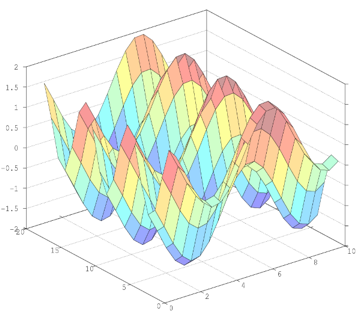
| and this leads me to the following error message : | google ( and the message error ) told me it comes from gnuplot backend. | error: evaluating if command near line 537, column 9 | error: gnuplot (as of v4.2) only supports 2D filled patches | error: called from `contourf:parse_args' in file | error: evaluating if command near line 205, column 3 | error: patch: property value is missing | So here is a simple example of my script : | cordinates of the isoline with the contourc command and then applying the | I assumed that using the contourf command is equivalent at finding the
GNU OCTAVE LFAT PATCH
| I would like to plot my data using a pcolor and then add a patch to hide a | However, there is one feature I can not make.
GNU OCTAVE LFAT SOFTWARE
| that I am very happy of the quality of this software so far:clap: I have provided a Flat and Call-Graph AST's.| This is my first post here as I am starting using Octave and I must confess This profiling-event-generator AST we need to put in place for the people to write profilers of their choice.

Once the profiling infrastructure is in place using the separate AST, then we can profile fine-grained events including So this is the missing-link in the profiler game. This however, does not affect the design of the profiler itself. Is a non-trivial task but that involves working on making the event hook mechanism delivery on function-call and return events. Making a AST type evaluator with the hooks for the interpreter Is required, as there will be a performance hit of about 2x compared to the non-profiling interpreter. What remains to be done is to write the hooks of the profilerįunction into a separate AST walker in the Octave interpreter,Īnd make the evaluation-AST changeable at runtime using I am posting the diffs against the files, and the 2 new files for The level of a event-based, call-graph profiler with access to Of the function calls (call-graph based profilers help here,įor compatibility with Matlab, it suffices to provide an API to reach Regular caveats of a flat-profiler in not knowing context Cannot handle exceptions in profiler gracefully.ģ. Cannot lookinto execution times of specific lines-of-codeĢ. There are following good points about the code,Ġ. Sophisticated or simple profiler based on the application. The JAVA's JVMPI (JVM Profiler Interface) which lets people build/use a I would personally prefer a 'event-based' profiler API like Many design decisions remain to be made, which I must leave it to betterĮxperienced. The python profiler ('import profiler')ĭoes something like this, and serves as a good template. >From this point, a simple call-graph profiler can also be implemented The API support touches the 4 files mentioned in the previous post. I have also added some elementary support for 'event-based' profiler ,įrom the Octave side, that notifies the routines for 'calls', and Time seconds seconds calls ms/call ms/call name

Sample output of profile command testcase 'testprofile.m' (attached) $(Ruby-Install-Path)/lib/profiler.rb authored by 'Matz' (Yukihiro
GNU OCTAVE LFAT CODE
This code is a C++ rewrite of the Ruby's flat-profiler from Runtimes, and frequency of call to each function. Statistics of the cpu-time of the functions (only), self & total average I have implemented a rudimentary "flat-profiler" that can just give



 0 kommentar(er)
0 kommentar(er)
